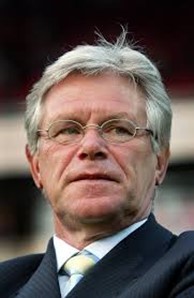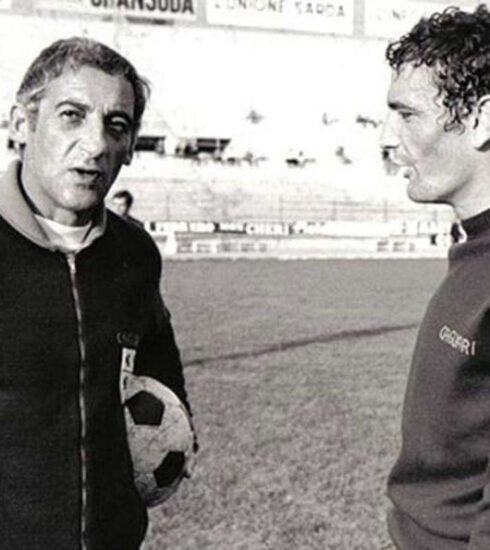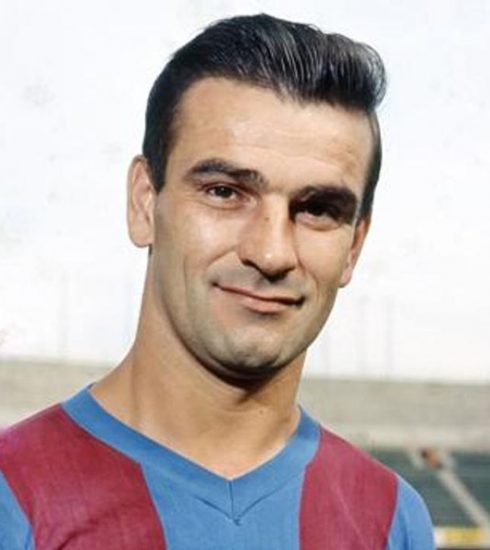JAN JONGBLOED: A life outside the area



“When Rinus Michels called me to play a friendly against Argentina a month before the World Cup in Germany I thought it was a joke by a friend.
Me in the national team? In an important match ahead of the World Cup?
Come on! It has to be a joke!
I had only played in the national team once.
12 years earlier and for a few minutes. I entered a handful of minutes from the end in a match against Denmark.
We were losing three to one… I even conceded a goal myself.
Then nothing more.
Until that day in May.
We play against Argentina and this time we win four to one.
I make my mark in a game that my teammates dominate from start to finish.
I touch more balls with my feet and head than with my hands.
Yes, because Rinus Michels asks me to do “as Gyula Grosics, the goalkeeper of the great Hungary, did”.
I don’t even know who he is.
Then Michels explains to me that he was the first ‘sweeper-goalkeeper’ in the history of football, because he would also come out of his area to foil the opponents’ counter-attacks.
I always played like that so it wasn’t a problem for me!
In Holland we were getting really good at football.
First Feyenoord and then Ajax, three years in a row, brought the European Cup, the most important continental club trophy, to our small country.
However, I did not play for either of these clubs.
I played in Door Wilskracht Sterk … in DWS to make it easier.
A small Amsterdam team that had been in the lower reaches of the league for a few years after our 1964 championship triumph.
I earned very little from football.
The one who fed me was my tobacconist, but that also left me time for the other two great passions of my life: fishing and football … in exactly that order!
The day came for the second phone call from Rinus Michels.
This time I recognise him.
“Jan, you’re coming with us to the World Cup in Germany”.
After the first moments of amazement and joy, the first thought was for my tobacconist’s shop.
And now? I’ll need help because my wife can’t run it alone.
I have to look after little Erik, who is eleven years old and crazy about football!
He plays in goal like me and I’m sure he’ll become much stronger and good than his clumsy madman father!
Not everyone takes it well to see me in the squad.
The Dutch media are even more amazed than I am to see my name among the 22 who will go to the World Cup.
“Of course, if we have to use an old man of almost 34 years of age as a third goalkeeper, we are not in the best shape!
This was just one of the ‘sweetest’ criticisms I received from newspapers and TV stations in my country.
Everyone expected to see Jan Van Beveren in my place.
Eight years younger than me.
He was playing with PSV becoming one of the strongest teams in the country after years of domination by Feyenoord and Ajax.
But the surprises were far from over.
In training session after training session I felt my confidence growing.
Often it was Johann Cryff himself who complimented me on my ability with my feet.
“Jan, you have feet that are much better than many players I know!” our captain and leader would often repeat to me.
To have his blessing was no small thing.
Johann’s charisma and his influence on Michels’ decisions were known and obvious to all.
But I could hardly have imagined that for our debut match at the German World Cup that I would take the field alongside Cruyff, Krol, Haan, Neeskens and Rensenbrink.
“Jan, against Uruguay you play,” Michels told me the day before the match.
“I need someone who is ready to come out of that blessed area if needed. The other 10 on the pitch will worry about not letting the opponents cross the halfway line … but if and when they do, you’ll have to take care of that.”
And that’s how it worked!
It was something never seen before on a football pitch.
It happened very often that with the opponents in possession of the ball, instead of falling back and waiting for them to make a mistake, as practically everyone did at that time, the whole team would sprint forward and put pressure on the opponent’s ball carrier, trying not to reason with him and to force him into making a mistake.
And the few times this strategy didn’t work, we needed a goalkeeper to shorten the distance between the opposing attackers and our goal.
… and that was the thing I knew how to do best!
We won against Uruguay, then drew against the Swedes before beating Bulgaria, Argentina and Brazil without appeal.
And yours truly, in spite of all the Cassandras, has only conceded one goal so far … and it was scored by my friend Ruud Krol!
Tomorrow we will play the final of the World Championship.
Facing us will be the hosts of West Germany.
They are strong.
Strong and organised.
But we have all the cards to ‘blow’ their organisation away.
Cruyff, Rep, Rensenbrink and Neeskens can strike at any time.
We are one step away from the top, from becoming WORLD CHAMPIONS …
Can you imagine how many new customers in my tobacconist’s shop?
Jan Jongbloed and Holland will not win the 1974 World Cup in Germany.
It will be the West Germans of Beckenbauer, Muller & co. who will ascend to the roof of world football that day.
Despite a fantastic World Cup, played by the Dutch at sublime levels.
Despite the fact that even in the final the Netherlands would teach the Germans a lesson in offensive football.
Football in that summer of 1974 would undergo the greatest revolution in its history.
Rinus Michels’ Holland was the definitive watershed between traditional and modern football.
‘Total Football’ they called it then.
And JAN JONGBLOED, the Amsterdam tobacconist, became that summer the most revolutionary, non-conformist and crazy goalkeeper in the history of football.
Holland lost that World Cup as it would lose the one in Argentina four years later, always in the final and always against the country that had organised the World Cup.
In goal, also in that Holland, was Jan Jongbloed, almost 38 years old.

Jan Jongbloed was born in Amsterdam on 25 November 1940.
He spent a good part of his career with Door Wilskracht Sterk, a small but fierce Amsterdam club where Jan played for a good 18 seasons (the last of which DWS was to be called FC AMSTERDAM) before moving to Roda in 1977 and then to Go Ahead Eagles in 1982 … where he played until his retirement in 1986 … at almost 46 years of age.
Jan soon came to the fore thanks to his very special qualities between the posts.
Timid and courageous in his exits, skilful with his feet and very effective between the posts, even if, with his stocky and ungainly physique, not exactly pretty to look at.
In September 1962, when he was not yet 22 years old, he made his national team debut.
The Netherlands plays Denmark in Copenhagen.
They suffer a narrow defeat (1:4) and Jongbloed is relatively culpable.
He enters with six minutes to go.
However, he is in time to concede a goal.
Twelve long years pass when he is recalled by Rinus Michels ahead of the World Cup in Germany.
Along with his clothes he carries a suitcase with equipment for his beloved fishing.
“I don’t have to play anyway,’ Jan thinks.
But instead he will play the entire World Cup and become, with his yellow jersey and the number ‘8’ on his shoulders, one of the protagonists of that great Netherlands.
Over the next four years he played a handful of matches for the national team before being replaced by the younger Piet Schrijvers for the 1976 European Championships in Yugoslavia.
However, when the World Cup in Argentina began two years later, Ernst Happel, the Austrian coach of the orange team, reverted to the now 38-year-old Jongbloed.
Jan did his full duty in the first two matches, which the Dutch finished without conceding a goal.
In the third game, however, they were defeated by Scotland three goals to two and Joengbloed was considered one of the ‘culprits’ in the defeat.
Piet Schrijvers will return as a starter but for him the World Cup will end minutes after the start of the victorious match against the Azzurri that will allow the Dutch to play their second consecutive World Cup final. The Ajax goalkeeper collided with defender Brandts, who put the ball into his own goal and ruined it on Schrijvers, putting him out of action.
Joengbloed returned to the pitch.
The Netherlands, with Brandts himself and a goal by Haan from forty yards, will overturn the result.
And so it was again ‘the tobacconist’ Jongbloed who defended his nation’s posts in a World Cup final.
Holland would also lose that final although Rensenbrink’s goalpost in the last minute of regulation time would shake the nights of Dutch players and fans for a long time to come.
Now that the World Cup is over, it is time for Holland to turn the page and try to rebuild the wonderful football machine that has been the Dutch national team for almost a decade.
Jongbloed is obviously one of the first ‘purged’.
He will never play another game for the national team and will end his career with only 24 appearances … of which at least a third played in the final phase of a World Cup.
He will return to Holland, where football has meanwhile become more popular and also richer.
But Jan will never give up his tobacco shop, even though he now has more time to devote to his two great passions: fishing and football.
He still enjoys playing and has no intention of becoming a full-time fisherman.
It is 23 September 1984.
Jongbloed is practically ready to take the field for a league match against Sparta in Rotterdam.
In the changing room a family friend enters.
“Jan come with me. We have to hurry to Amsterdam.”
Jan doesn’t even change, he gets into the car with his friend.
What awaits him is the worst thing that can happen to a father.
His son Erik, a goalkeeper like his father, was playing in a Dutch D-league match that very afternoon.
A violent thunderstorm had broken over the game and Erik was sending in a goal from the back when lightning struck him.
Erik, 21 years old, son of Jan Joengbloed, died on that football pitch.
Jan Jongbloed will never fully recover from what happened that day.
He goes back to playing, hoping it will help him forget, but it is never the same again.
Not even a year later, during a training session with his Go Ahead Eagles, he has a heart attack.
They manage to save him but it is obvious that football must be a thing of the past.
It is hard not to think that what happened to his son Erik may have affected Joengbloed’s health.
Today he is a commentator for Dutch TV.
He sold his tobacco shop but still goes fishing … and leaves us all with an unanswered question: how much would a goalkeeper with Jongbloed’s feet be worth today?

ANECDOTES AND CURIOSITIES
The choice of the number 8 shirt at the World Cup in Germany for Jongbloed was due to the simple fact that the numbers were decided in strict alphabetical order.
The only one who did not respect this criterion was Johann Cruyff, who of course dictated that he wear his number 14 shirt.
Had he also respected the criterion of alphabetical order Johann Cruyff would have played the World Cup in Germany with … the number ‘1’.
When the controversy broke out in Holland over Jongbloed’s surprise call-up against the young up-and-coming Van Beveren, one of the first to defend the DWS goalkeeper was Johann Cruyff … with a rather unusual statement!
“He may not be the strongest goalkeeper in the world, but he is very nice and fills the dressing room with joy”.
… although later, as mentioned, thanks also to Cruyff’s intercession, Jongbloed played all the matches of that beautiful World Cup.
Another of Jongbloed’s quirks was the fact that he did not use gloves.
“I can’t feel the ball,” he said to explain this choice of his.
‘I find it much easier to block it without the gloves,’ Jongbloed added.
… and then, we would add, he used his feet and head perhaps more often than his hands …
Jan Jongbloed has spoken on very few occasions about the tragedy of his son Erik.
What is known for sure is that Erik Jongbloed’s team-mate, defender Rob Stenacker, was about to kick that goal kick. At the last moment Erik told him ‘go ahead Rob, I’ll kick this one’.
Thus saving his life.
Jan Jongbloed is still the record holder in the Dutch league.
In his 27-year career he has been on the pitch 707 times.
A record that is very unlikely to be broken.
Finally, Jan Jongbloed’s decision never to leave Holland, even after the 1974 World Cup where offers from German, Belgian and French teams arrived for him.
“I have a tobacconist’s shop to run, all my friends are here and then I already live in the most beautiful country in the world: Holland.
That same Holland that had such a hard time accepting this ‘ugly duckling’ to defend the goal of one of the strongest teams in the history of football … but then fell in love with him and his unique and revolutionary style.





